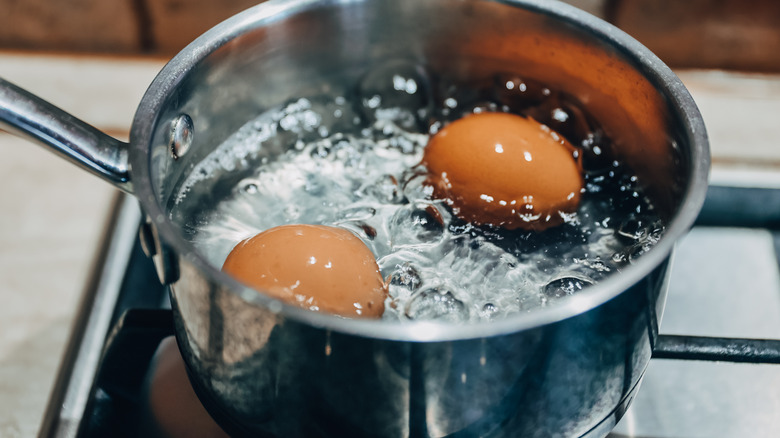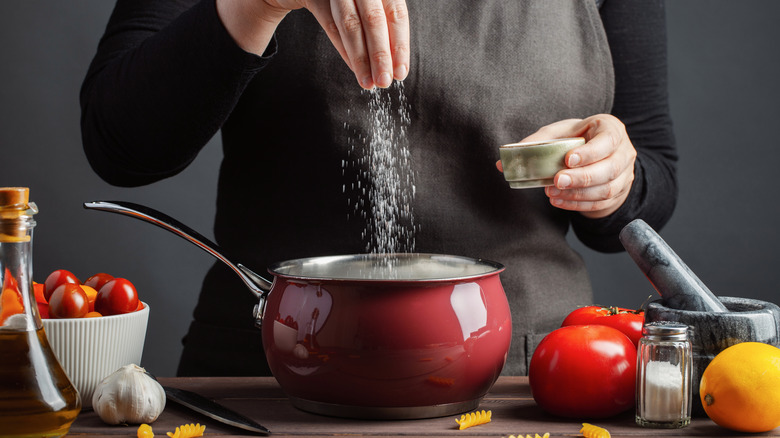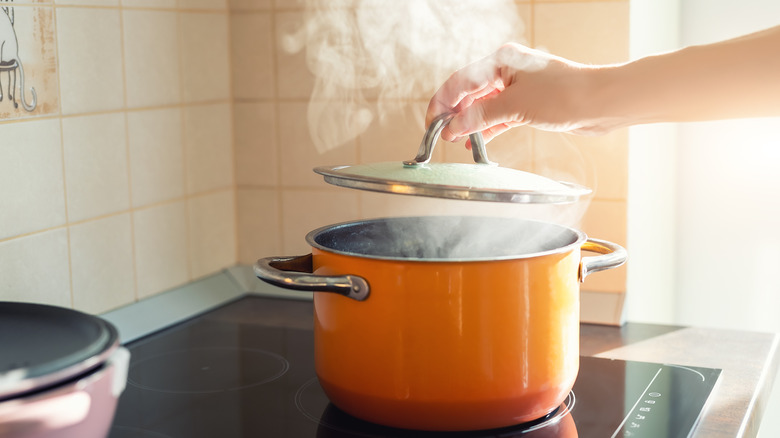The Perplexing Myth You Should Stop Believing About Boiling Water
Kitchen folklore and old wives' tales have been passed down through generations, leading to some odd practices that some of us still do today: Chewing on a piece of bread while cutting onions prevents tears. If a spaghetti noodle is thrown at the wall and it sticks, that means the pasta is cooked perfectly. One of the strangest of these notions is that cold water boils faster than hot water. While this idea seems to go against science, plenty of cooks still avoid filling a pot with hot water before placing it to boil on the stove.
As you might have guessed, this idea is a myth, and warmer water boils faster than cold water. The laws of thermodynamics are immutable, and the only thing that gets water boiling is reaching the temperature of 212 degrees Fahrenheit (100 degrees Celsius). Imagine a pot of 40 degree water and a pot of 80 degree water. While it is true that the cold one will heat at a faster rate than the warm one – heat transfer naturally flows from hot to cold – it's already starting way behind in the race to 212 degrees Fahrenheit. It's impossible for it to catch up to the warmer water and beat it in the race. This isn't the only boiling myth that doesn't hold water.
The effects of adding salt to water
Properly salting water is an essential step for cooking pasta, as well as veggies like potatoes, but it doesn't have any effect on how fast the water boils. There are two unique elements that salt water has, compared to fresh water. The first is its heat capacity, or the amount of heat needed to raise the temperature by one degree. Salt water's heat capacity is much lower than fresh, meaning it will technically boil faster. However, salt also increases the boiling point of water from 212 degrees Fahrenheit to almost 216 degrees.
In combination, these two facts conflict with each other, resulting in virtually no time differences for boiling salt water versus plain water. It would take a massive amount of salt to see any change at all in the boiling time. For reference, natural salt water has a concentration of only 3.5%, and no one is about to cook with water that salty. The salinization of water would have to reach at least 20% for there to be a noticeable change in boiling times.
How to actually speed up boiling water
While neither of the aforementioned wives' tales are accurate, there are a few tips that will speed up the process of boiling water. The first tip is to cover the pot with a lid. The lid traps heat in the pot that would otherwise escape in the form of steam, making the water hotter faster. Preventing heat loss creates a quicker boiling time. Another option is to increase the surface area of the water. A pot of water heats from the bottom up, and the further the heat has to travel to the surface, the longer it takes to boil. Using either less water or a shallower vessel like a pan means more of water is in direct contact with the heat source.
Altitude also has a serious effect on boiling times. The number of 212 degrees Fahrenheit actually only applies to water boiled at sea level. At higher altitudes, atmospheric pressure decreases, so for every 500 feet above sea level, the boiling temperature goes down by about one degree. If you live somewhere with higher altitude, try researching how that will affect your cooking.



